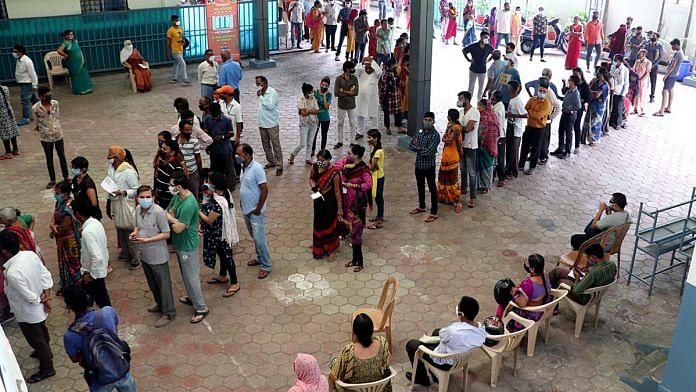New Delhi: By the first week of June this year, 67.6 per cent Indians had antibodies against the SARS-CoV-2 virus, the latest sero survey by the Indian Council of Medical Research (ICMR) shows.
It also found that seropositivity among minors was very high — 57.2 per cent in the 6-9 years age group. Among those in the 10-17 years age groups, it was 61.6 per cent, while that among healthcare workers stood at 85.2 per cent.
Further, seropositivity among unvaccinated people was found to be about 62 per cent.
The survey, conducted in June and July, only detects people with antibodies, but cannot clearly make the distinction on the source, i.e., vaccination and infections. This is because vaccinated people who may or may not ever have had the infection also have antibodies.
On 1 June, India had a total of 2.8 crore Covid cases. This means that till the first week of June, only one in every 30 Covid-19 infections in the country had been medically diagnosed.
Based on data from unvaccinated individuals, the survey shows that the total number of infections in the country at that point of time stood at over 84.94 crore.
The last sero survey was concluded in the first week of January when the total sero positivity stood at 24.1 per cent. Although between then and the latest survey, India witnessed a devastating second wave that pushed case numbers up significantly, the sero survey results show that the number of missed infections has gone up — from 23 missed infections per detected case to 29 missed infections per detected case.
Also read: Fearing Covid, 3 Andhra women ‘self-isolate’ for 15 months, come out malnourished & depressed
Survey specs
The survey was carried out among 28,975 people that include 7,252 healthcare workers across 70 districts and 21 states of the country. These are the same districts where the first three rounds of the sero survey were conducted.
Of the individuals surveyed, 62.2 per cent had no vaccination, 24.8 per cent had taken one dose and 13 per cent were fully vaccinated. However, 10.5 per cent of healthcare workers were unvaccinated. This despite the fact that India had first started vaccinating healthcare workers when it kicked off its national immunisation programme on 16 January 2021.
Sero positivity was 81 per cent among people who had taken one vaccine dose and 89.8 per cent among those with both doses.
The highest sero positivity was found in the 45-60 years age group — 77.6 per cent.
In terms of gender distribution, 65.8 per cent of males and 69.2 per cent of females were found to be seropositive.
The sero prevalence was similar in urban and rural areas.
Announcing the results of the sero survey, ICMR Director General Dr Balram Bhargava said: “The data shows that a third of the population did not have antibodies, which means 40 crore Indians are still vulnerable. However, national serosurvey is no substitute for local (state/district) variations. State-led sentinel sero-surveillance will inform further state-level action and state heterogeneity indicates possibility of future waves of infection.
“Societal, public, religious and political congregations should be avoided as also non-essential travel. It is only safe for those individuals to travel that are fully vaccinated,” he added.
Primary schools should open first
At the conference to announce the results, both Dr Bhargava and Niti Aayog member (health), Dr V.K. Paul emphasised on the need for continued Covid-19 appropriate behaviour.
Replying to a question, Dr Bhargava said, “Children can handle viral infection better than adults. Moreover, it has been seen that young children have lower numbers of ACE2 receptors in their lung cells. However, the antibody exposure we have seen in this sero survey among children is very similar to adults — 58.2 versus 61.6. Some countries, especially Scandinavian countries, did not shut down primary schools at all. So once India starts considering, [it is] wise to open primary schools first, and that too when all staff —both teaching and non teaching — are fully vaccinated.”
However, the decision to open schools will be contingent on the pandemic situation in a particular district and indicators such as test positivity rate, they added.
Herd immunity
While the high seropositivity gives rise to hope that India is finally achieving the elusive herd immunity, both the experts cautioned against making any such conclusions, primarily because herd immunity will depend on seropositivity numbers at a local level and the present survey does not give that kind of granular data.
It also shows that one in three Indians is still vulnerable to Covid-19, so any unwarranted congregation or continued violation of Covid norms will have grave consequences.
“It is preferable to get immunity by vaccination, not by infection. That is why we need to continue with our strategy of test, track, treat and vaccinate, and also strict containment measures,” Dr Paul said.
(Edited by Manasa Mohan)
Also read: Has Covid exposed limitations of ‘secretive’ ICMR? Some experts think so



